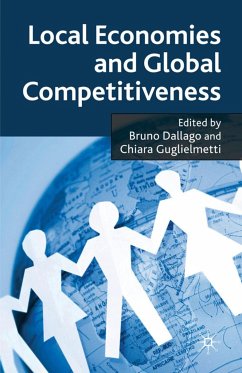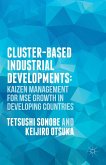Local Economies and Global Competitiveness
Herausgegeben:Dallago, B.; Guglielmetti, C.
38,99 €
inkl. MwSt.
**Unverbindliche Preisempfehlung des Herstellers
Versandkostenfrei*Versandfertig in 6-10 Tagen

19 °P sammeln
Local Economies and Global Competitiveness
Herausgegeben:Dallago, B.; Guglielmetti, C.
- Gebundenes Buch
- Merkliste
- Auf die Merkliste
- Bewerten Bewerten
- Teilen
- Produkt teilen
- Produkterinnerung
- Produkterinnerung
The globalized economy depends on local and context-specific factors. This edited volume addresses local-global nexuses via case studies of global interactions in developed and developing areas, and of particular firms' approaches to these issues. The chapters build up a prospectus on how best to create globally capable localities.
Andere Kunden interessierten sich auch für
![Local Economies and Global Competitiveness Local Economies and Global Competitiveness]() Local Economies and Global Competitiveness38,99 €
Local Economies and Global Competitiveness38,99 €![Cluster-Based Industrial Development Cluster-Based Industrial Development]() T. SonobeCluster-Based Industrial Development38,99 €
T. SonobeCluster-Based Industrial Development38,99 €![Cluster-Based Industrial Development: Cluster-Based Industrial Development:]() T. SonobeCluster-Based Industrial Development:75,99 €
T. SonobeCluster-Based Industrial Development:75,99 €![Creating Economic Growth Creating Economic Growth]() M. MagnaniCreating Economic Growth38,99 €
M. MagnaniCreating Economic Growth38,99 €![Cluster-Based Industrial Development Cluster-Based Industrial Development]() T. SonobeCluster-Based Industrial Development38,99 €
T. SonobeCluster-Based Industrial Development38,99 €![Creating Economic Growth Creating Economic Growth]() M. MagnaniCreating Economic Growth38,99 €
M. MagnaniCreating Economic Growth38,99 €![Sme Cluster Development Sme Cluster Development]() Mario Davide ParrilliSme Cluster Development75,99 €
Mario Davide ParrilliSme Cluster Development75,99 €-
-
-
The globalized economy depends on local and context-specific factors. This edited volume addresses local-global nexuses via case studies of global interactions in developed and developing areas, and of particular firms' approaches to these issues. The chapters build up a prospectus on how best to create globally capable localities.
Produktdetails
- Produktdetails
- Verlag: Palgrave Macmillan / Palgrave Macmillan UK / Springer Palgrave Macmillan
- Artikelnr. des Verlages: 978-0-230-25272-1
- 2011
- Seitenzahl: 285
- Erscheinungstermin: 10. Dezember 2010
- Englisch
- Abmessung: 224mm x 146mm x 24mm
- Gewicht: 498g
- ISBN-13: 9780230252721
- ISBN-10: 0230252729
- Artikelnr.: 30976325
- Herstellerkennzeichnung
- Libri GmbH
- Europaallee 1
- 36244 Bad Hersfeld
- gpsr@libri.de
- Verlag: Palgrave Macmillan / Palgrave Macmillan UK / Springer Palgrave Macmillan
- Artikelnr. des Verlages: 978-0-230-25272-1
- 2011
- Seitenzahl: 285
- Erscheinungstermin: 10. Dezember 2010
- Englisch
- Abmessung: 224mm x 146mm x 24mm
- Gewicht: 498g
- ISBN-13: 9780230252721
- ISBN-10: 0230252729
- Artikelnr.: 30976325
- Herstellerkennzeichnung
- Libri GmbH
- Europaallee 1
- 36244 Bad Hersfeld
- gpsr@libri.de
ZOLTAN J. ACS School of Public Policy, George Mason University, USA DAVIDE ANTONIOLI Department of Economics, Institutions and Territory (DEIT), University of Ferrara, Italy TÜNDE CSERPES Eötvös Loránd University (ELTE), Budapest, Hungary PÉTER CSIZMADIA Institute of Sociology, Hungarian Academy of Sciences (HAS), Budapest, Hungary LUTZ EIGENHÜLLER IAB Institute for Employment Research, Nuremberg, Germany STEFAN FUCHS IAB Institute for Employment Research, Nuremberg, Germany GEREMIA GIOS Department of Economics, University of Trento, Italy ILARIA GOIO Department of Economics, University of Trento, Italy ALESSANDRO GRETTER IASMA Research and Innovation Centre, Fondazione Edmund Mach, Trento, Italy MIKLÓS ILLÉSY Institute of Sociology, Hungarian Academy of Sciences (HAS), Budapest, Hungary ICHIRO IWASAKI Institute of Economic Research at Hitotsubashi University, Tokyo, Japan WALDO KRUGELL School of Economics, North-West University (Potchefstroom Campus), South Africa NICOLE LITZEL University of Regensburg and IAB Institute for Employment Research, Nuremberg, Germany CSABA MAKÓ Institute of Sociology, Hungarian Academy of Sciences (HAS), Budapest, Hungary MARIANNE MATTHEE School of Economics, North-West University (Potchefstroom Campus), South Africa MASSIMILIANO MAZZANTI Department of Economics, Institutions and Territory (DEIT), University of Ferrara, Italy JOACHIM MÖLLER University of Regensburg, Institute for Employment Research, Nuremberg andIZA, Germany SANDRO MONTRESOR Department of Economics, University of Bologna, Italy WIM NAUDÉ World Institute for Development Economics Research, United Nations University, Helsinki, Finland CONNIE L. MCNEELY School of Public Policy, George Mason University, USA PIER CARLO PADOAN OECD and University of Rome, Italy PAOLO PINI Department of Economics, Institutions and Territory (DEIT), University of Ferrara, Italy SILVIA SACCHETTI Stirling Management School, University of Stirling, UK JOSEPH SANY School of Public Policy, George Mason University, USA MARIO SCERRI Institute for Economic Research on Innovation (IERI), Faculty of Economics and Finance, Tshwane University of Technology, South Africa MARIA LUIGIA SEGNANA Department of Economics, University of Trento, Italy ROGER SUGDEN Stirling Management School, University of Stirling, UK ZOLTÁN SZÁNTÓ Corvinus University of Budapest, Hungary MIKLÓS SZANYI Institute of World Economics, Hungarian Academy of Sciences (HAS), Budapest, Hungary Debrecen University, Faculty of Economics and Business Administration, Hungary CHIARA TOMASI Scuola Superiore Sant'Anna and University of Urbino, Italy ISTVÁN JÁNOS TÓTH Institute of Economics, Hungarian Academy of Sciences (IE HAS), Budapest, Hungary GIUSEPPE VITTUCCI MARZETTI Department of Economics, University of Trento, Italy ZHIKAI WANG School of Economics, Zhejiang University, China
Introduction; B.Dallago & C.Guglielmetti Context and Proximity in Competitiveness and Cohesion: Theoretical and Empirical Challenges; C.Guglielmetti PART I: TERRITORIES, DEVELOPMENT AND COMPETITIVENESS Globalization and Local Economic Growth in South Africa, 1994 to 2004; W.Naudé, W.Krugell & M.Matthee Local Systems of Innovation and Globalization in South Africa; M.Scerri Transition and Transplantation in Local Development Models: the Case Study of the Yangtze River Delta; Z.Wang Cluster Development in Hungary: Searching for a 'Critical Mass' of Business via Cluster Mapping; M.Szanyi , I.Iwasaki , P.Csizmadia , M.Illèsy & C.Makó Local Government Corruption in Hungary; Z.Szántó , I.János Tóth & T.Cserpes Cluster Identification, Firm Culture and Cooperation Activities in an European Metropolitan Region: the Case of Nuremberg; L.Eigenhüller, S.Fuchs, N.Litzel & J.Möller Beyond Commons - New Perspectives and Role for Common Properties; A.Gretter , I.Goio & G.Gios PART II: FIRMS, CONTEXT AND PROXIMITY Innovation Driven Growth: Analytical Issues and Policy Implications; P.Carlo Padoan Considering the Social Impact of for-profit Innovation at the Local Level: the Cases of Grameen Bank and Microsoft; Z.Acs, C.L.McNeely & J.Sany The Public Interest in Local Economic Development and Creativity: a Knowledge Governance Perspective; S.Sacchetti & R.Sugden Local and Global Sourcing: Quality Heterogeneity and Firms' Efficiency; G.Vittucci Marzetti, M.Luigia Segnana & C.Tomasi Outsourcing and Firm Productivity: Evidence for an Italian Local Production System; D.Antonioli , M.Mazzanti , S.Montresor & P.Pini Index
Introduction; B.Dallago & C.Guglielmetti Context and Proximity in Competitiveness and Cohesion: Theoretical and Empirical Challenges; C.Guglielmetti PART I: TERRITORIES, DEVELOPMENT AND COMPETITIVENESS Globalization and Local Economic Growth in South Africa, 1994 to 2004; W.Naudé, W.Krugell & M.Matthee Local Systems of Innovation and Globalization in South Africa; M.Scerri Transition and Transplantation in Local Development Models: the Case Study of the Yangtze River Delta; Z.Wang Cluster Development in Hungary: Searching for a 'Critical Mass' of Business via Cluster Mapping; M.Szanyi , I.Iwasaki , P.Csizmadia , M.Illèsy & C.Makó Local Government Corruption in Hungary; Z.Szántó , I.János Tóth & T.Cserpes Cluster Identification, Firm Culture and Cooperation Activities in an European Metropolitan Region: the Case of Nuremberg; L.Eigenhüller, S.Fuchs, N.Litzel & J.Möller Beyond Commons - New Perspectives and Role for Common Properties; A.Gretter , I.Goio & G.Gios PART II: FIRMS, CONTEXT AND PROXIMITY Innovation Driven Growth: Analytical Issues and Policy Implications; P.Carlo Padoan Considering the Social Impact of for-profit Innovation at the Local Level: the Cases of Grameen Bank and Microsoft; Z.Acs, C.L.McNeely & J.Sany The Public Interest in Local Economic Development and Creativity: a Knowledge Governance Perspective; S.Sacchetti & R.Sugden Local and Global Sourcing: Quality Heterogeneity and Firms' Efficiency; G.Vittucci Marzetti, M.Luigia Segnana & C.Tomasi Outsourcing and Firm Productivity: Evidence for an Italian Local Production System; D.Antonioli , M.Mazzanti , S.Montresor & P.Pini Index







